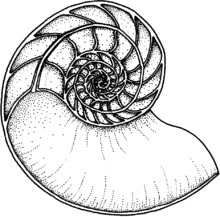Agoniatitida
| Agoniatitida | |
|---|---|

| |
| An image showing the siphuncle (which could be agoniatitid), the tube which connects the current living shell to the previous ones. | |
| Scientific classification | |
| Domain: | Eukaryota |
| Kingdom: | Animalia |
| Phylum: | Mollusca |
| Class: | Cephalopoda |
| Subclass: | †Ammonoidea |
| Order: | †Agoniatitida Ruzhencev, 1957 |
| Suborders | |
Agoniatitida, also known as the Anarcestida, is the ancestral order within the cephalopod subclass Ammonoidea originating from bactritoid nautiloids, that lived in what would become Africa, Asia, Australia, Europe, and North America during the Devonian from about the lower boundary of Zlichovian stage (corresponding to late Pragian, after 409.1 mya) into Taghanic event during upper middle Givetian (between 385 and 384 mya), existing for approximately 25 million years.
Taxonomic nomenclature
The Order Agoniatitida, named by Ruzhencev, 1957,[1] is a subjective synonym for the Order Anarcestida, named by Miller and Furnish, 1954.[2] Accordingly, the name Anarcerstida is based on the family Anarcestidae (ex Anarcestinae) of Steinmann 1890. That of Agoniatiida is based on the family Agnoniatidae of Holzapfel, 1899.
Saunders, Work, and Nikolaeva, 1999,[3] refer to the Anarcestida, with Agoniatina a suborder, maintaining the priority as found in the Treatise. Shevyrev, 2006[4] on the other hand follows Ruzhencev, 1957 and used Agonititida.
Morphology
Agoniatitids are primitive ammonoids with a ventral retrochoanitic siphuncle (septal necks point to the rear) reflective of their nautiloid ancestors and goniatitic sutures with a variable number of lobes. Shells vary from discoidal to globular. Coiling may be loose with whorls barely touching or tight with a dorsal impression.[2]
Fossil distribution
Fossils are restricted to strata of the Zlichovian (Late Pragian/Early Emsian) to late middle Givetian epochs.
Sources
- ^ PaleoBiology Database: Agoniatitida, basic info
- ^ a b Miller, Furnish, and Schindewolf, 1957; Paleozoic Ammonoidea; Treatise on Invertebrate Paleontology, Part-L, Ammonoidea, Geological Society of America & Univ of Kansas.
- ^ Evolution of Complexity in Paleozoic Ammonoid Sutures; Supplementary Materia
- ^ A. A. Shevyrev. 2006. The cephalopod macrosystem: A historical review, the present state of knowledge, and unsolved problems: 3. Classification of Bactritoidea and Ammonoidea. Paleontological Journal 40(2):150-161
